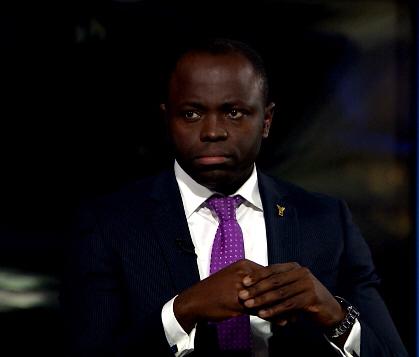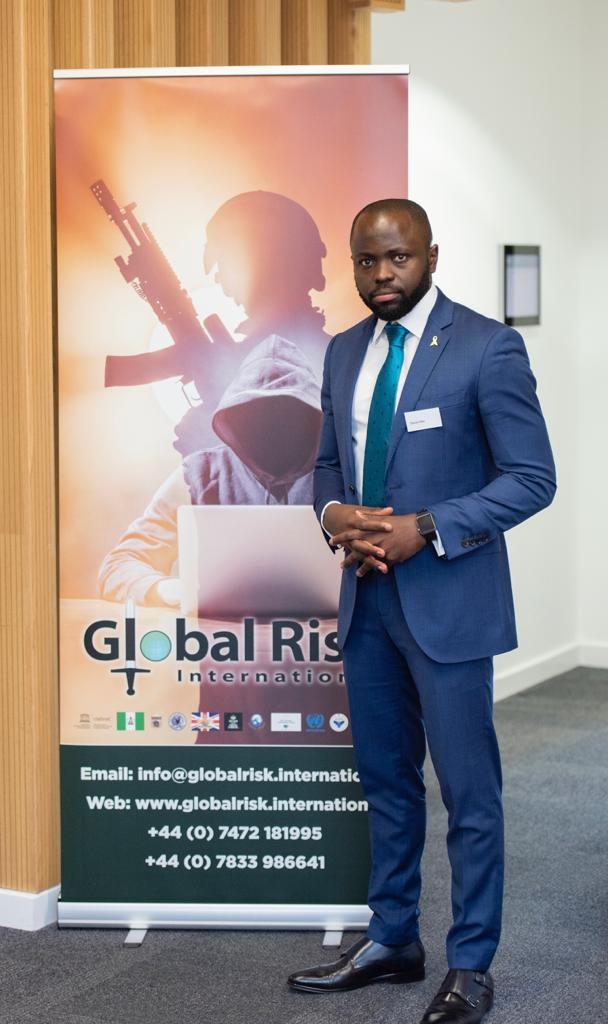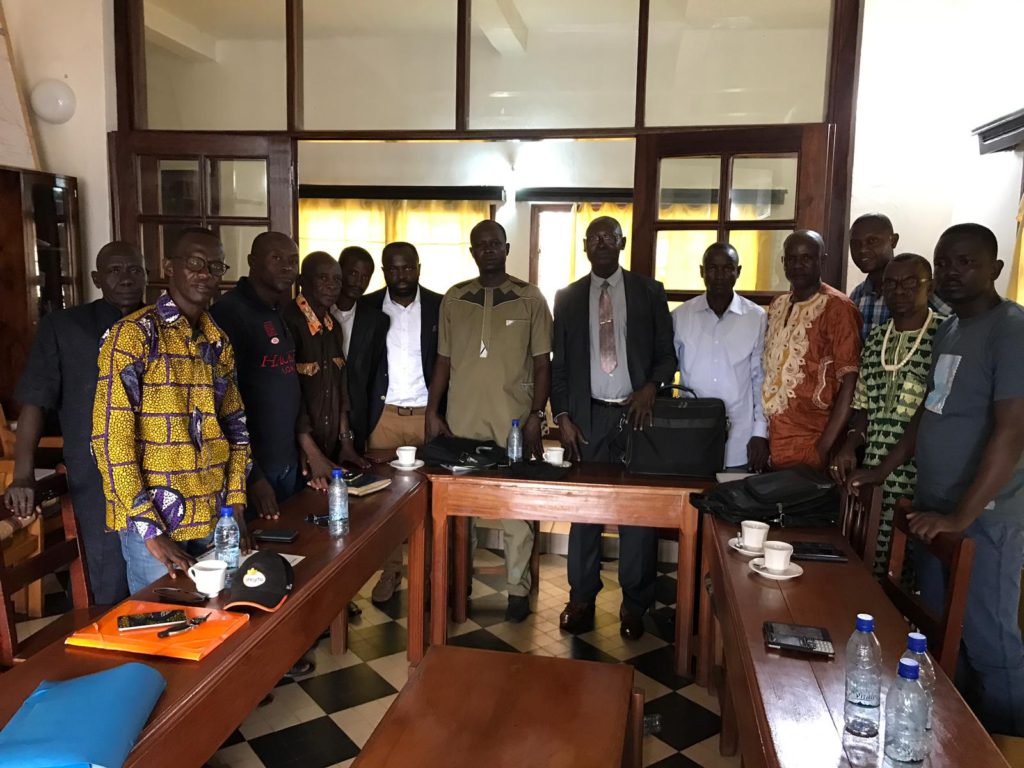Cameroonian born David Otto is a well-respected international consultant on security and counter terrorism. He has just been to Central African Republic to deliver a strategic and proactive framework to tackle the crime-terror nexus. That is where The Voice International Correspondent met the expert who is also director of Global Risk International UK Ltd and NATO consultant for a press chat. He bared his mind on the Grande national Dialogue unfolding in Yaounde
“The Grande National Dialogue was dead on arrival – but It could be resuscitated with good will and adequate planning: The Grand National Dialogue (GND) was an overdue laudable Presidential response perhaps triggered by the ongoing 3 years Ambazonia Separatists war in the North West and South West regions of Cameroon.
The prescribed working framework handed to the office of the Prime Minister was loaded with immediate operational and implementation challenges that indicated the process was literally ‘Dead On Arrival’.
The 8 pre-conceived committees created focused squarely on the Ambazonia Crisis and the points of contention, yet elites from across the nation and beyond were drafted in to decide on the way forward for two regions ONLY – those who were appointed to chair the committees by the coordinators did so with little input from the pré-consultation – it is clear that appointments we’re very strategic.

Political cronies of the state who favour the state version of decentralisation and the statusquo were placed in the decentralisation committee – those elites who showed signs of favouring a return to Federalism or Separation before 1972 were kept clear of discussion on form of the state – in fact they were given options in committees on resettlement – Bilingualism reconstruction and Disarmament. Their task is to come up with ways of ending the war perhaps at all cost.”
President Biya gave an opportunity to Cameroonians to put the stakes on the table! But why are many people so concerned about its scope and wanting it to focus only on the Anglophone reawakening?
The Grand National Dialogue (GND) came loaded with restrictions limiting the mandate of discussions to tip-toe around the subject of the form of the state – an underlying causation element in the ongoing war between government forces and Ambazonia Separatists Armed Groups.
The scope of ‘A Grand National Dialogue’ was too broad even though it was specifically set up to address – the Ambazonia Separatist war as national priority.
Cameroon faces a differential crisis – Boko Haram in the North – Rebels from Central Africa in the East – political turmoil in the Centre and Ambazonia crisis in the North West and South West regions.
These diverse crises have individual dynamics and the need for a breakdown to resolve them piece by piece rather than an attempt to swallow them at once in one Grande Dialogue.
Prime minister Dion Ngute extended individual invitations to some of the separatist leaders in the diaspora like Mark Bareta, Dr Ayaba Cho Lucas, Chris Anu, Herbert Boh, John Mbah Akuro just to name a few. But they all rejected the invitation with vehemence. One could think that it was an invitation for the separatists to table their grievances in a more formal manner? Was it a problem of the timing and venue?
There is never a right time to end a crisis but the time required for pre-consultation planning and preparation cannot be rushed especially if there is desire to get all parties within and outside the country to buy-in.
Failure to plan with others is a good indicator of planning to fail with everyone. The state needed to initiate a number of feasible trust and confidence building measures. A window of ceasefire was needed to allow for willing Ambazonia separatist leaders to take part in the dialogue – mere invitations to attend is undermining key actors in a possible peace process.
An amnesty and or indemnity from arrest during the dialogue period is very crucial in peace building – this was clearly lacking. No separatist leader in or outside Cameroon will accept an invitation to take part in the process and risk arrest baring in mind their leadership structure sentenced to life in Cameroon.
More compounded by the government’s refusal to invite jailed Ambazonia leaders Sisiku Ayuk Tabe and co held in Yaounde in maximum security prisons. They could have been given a temporary amnesty for the Grande National Dialogue.
Concerning the venue, Yaounde posed an immediate threat to any separatist leader thinking of attending made worse by threats of arrest by the state.
Not leaving out the arrest of Abdul Karim a well-known Muslim scholar, activist and pro- southern Cameroonian proponent who was arrested and locked up at the Secretariat of State for Defence, SED in Yaounde some days before the start of the National Dialogue.
Yaounde was not the best venue at this stage of the crisis. A more neutral venue or anywhere within the affected regions could have been better.
This could have permitted ordinary people who are facing the brunt of the crisis to attend and express their wishes. Conference Centre in Yaounde was bound to deny separatists a space to participate without any guaranteed security and trust.
Also, the Prime Minister’s office tasked to coordinate, facilitate and mediate are not seen as trusted facilitators and mediators obviously by Ambazonia separatists. A neutral party would have done justice to any suspicion which must always be founded on trust.
There is the Bishop Andrew Nkea of Mamfe who drew the attention of the prime minister to the October 1 Independence Day celebration even as the dialogue forum was unfolding. The Ambazonia fighters paraded with war guns. The have been seen on speed boats in Ndian waters. What could this signify?
The vidéo indicates that the Separatists are in full control of huge rural territories in both regions while the government remains in partial control of some urban cities.
Each respecting the others sphere of influence. When one crosses the line, there are deadly consequences. This is explained using the ´trust versus fear’ phenomenon.
The people in these villages are fed up with the government response to their plight and its failure to provide them basic necessities including protection. The Ambazonia fighters are providing these local services and the people rely on them with fear of reprisals if they betray them.
When trust is lost, fear becomes the new trust. This people see no hope in a system they cannot trust and whatever is happening faraway in Yaounde means nothing to them especially in the absence of a ceasefire agreement while the ´Grand Dialogue’ goes on.
After this Grande National Dialogue. What do we expect going fowards?
Any outcome that prescribes Decentralization as the solution will not sink with hardline Armed separatists hence it will not stop the war. A return to a Federal system of a nature experienced before 1972 will quench the current fire – but it will require planning and preparation for confidence building measures including amnesty for jailed separatists and those in the diaspora.
With a trusted mediator in a neutral ground that is not Yaounde – the government can salvage the ongoing war and celebrate with a Grande National Reconciliation in the two affected regions.
About David Otto

He is specialised in programme design and implementation for counter terrorism and Organised Crime – Including CVE/PVE Community based interventions and Cohesion tactics. He is an expert consultant for NATO Defence Against Terrorism – Interpol Global Counter Terrorism Strategy – USA-AFRICOM Strategic consultant on Terrorist Motivations and Networks in Africa – and a capacity building consultant for governments in East – West and Central Africa on developing locally based inter-agency National Anti & Counter Terrorism Strategies. As a Certified Master Anti-Terrorism Specialists (CMAS) – David represents the Anti Terrorism Accreditation Board (ATAB) for Europe and Africa as a certification trainer for those who register for the Certified Anti Terrorism Specialist (CAS) Course with ATAB.
Our Special Correspondent to Bangui, Zigoto Tchaya Tchameni first asked what brought him to Central Africa?
LAST LINE
Global Risk international is Africa focused. With Daesh collapse and recent displacement from their strong hold in Iraq and Syria and the influx of experienced Daesh foreign fighters retuning to Africa unchecked via porous borders and networking with existing Al-Qaeda – ISIS and Al-Shabaab networks in Africa, we have developed a framework for a new Counter Terrorism and Organised Crime localised strategy for West – East and Central African countries to adopt.
This framework where adopted, will enable trained multi-agency stakeholders to gradually identify existing threats and develop specific measures that will enable practitioners take control and responsibility for prevention – protection of people and assets from the activities of organised criminal groups and disorganized terrorist networks in the continent.
CAR is situated in the heart and centre of Africa – 6 years of unending conflict grounded on multiple resource exploitation masked and wrapped in religious and ethnic lines has left the country in perpetual instability and the region extremely vulnerable to influx of ISIS type of twisted jihadist ideology.

He was in Bangui to engage with local stakeholders in the hope that some awareness of these threats are created with various existing local- national and international key players.
My visit coincides with the implementation phase of the Khartoum Peace Accord between the 14 recognised Armed groups and the government of CAR supported by other guarantors.